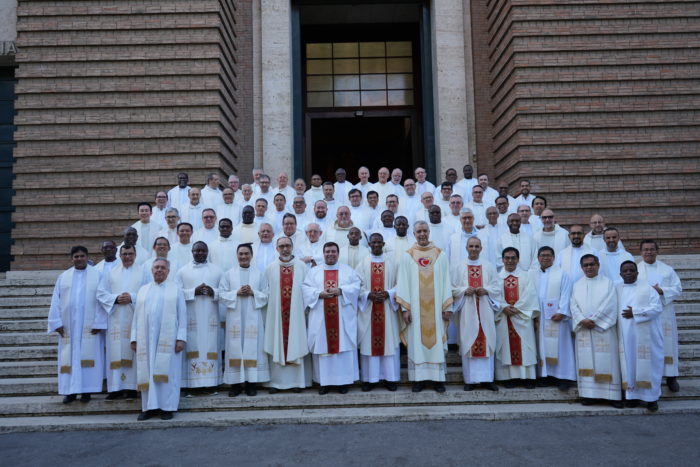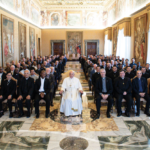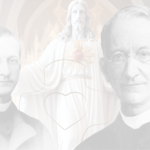
We, Dehonians
- We, Dehonians, represented by seventy-eight Chapter members, have gathered in Rome from 16th June to 5th July 2024 to celebrate the XXV General Chapter. With a synodal spirit and openness to the Holy Spirit, we have committed to listening to each other, sharing the “joys and sorrows” of our Entities around the world. Sint Unum makes cultural, linguistic and ethnic diversity a challenging, but truly enriching experience and makes our hearts beat in unison with the Master’s Heart.
- During these days, the entire Congregation and especially the Chapter members have prayed and worked to find the best ways to live unity in a rapidly changing world. Inspired by Jn 17:21, we believe that we must witness to the world that unity is possible. As Fr. Francisco José Ruiz Pérez, SJ, shared in his meditation on the first day of the Chapter, the fragmentation that is harming people, societies, nations and the Church must be faced starting from the commandment of unity. We, Dehonians, through our charismatic inspiration, founded on Christ’s restorative love, are a sign of this unity in a world that is divided, polarized, violent and marked by growing individualism and indifference, which do so much harm to humanity.
- The motto of the 1991 chapter, “We, Congregation”, still resonates within us. Evangelical witness demands that we overcome the “I” mentality and convert to the “we” mentality (Sint Unum), as a personal process, as well as at the level of the organization and governance of our Entities. For this reason, we are called to return to the origins of our Congregation, to study our sources, to deepen our knowledge of Fr. Dehon so that, in the words of Pope Francis, the gift of unity echoes in all of us as a vital expression of our charism.
- This process requires that the Dehonian identity continues to evolve. In this way, the Congregation gradually perceives itself as less Eurocentric and more universal. In the early days of our foundation, Fr. Dehon sent European missionaries to other parts of the world. The growth of Dehonian presence in new geographical areas widens even more the awareness of cultural plurality as an element which enriches our charismatic identity.
- The nature of the Chapter is to look at the Congregation as a whole. Guided by the Instrumentum Laboris and the complementary documents, Chapter members have looked at the reality of the Dehonians by analysing the six dimensions that guide our apostolate.
Dehonian Identity
- As the Catholic faith teaches, the truth about human being builds on two inseparable dimensions: being unique, individual, unrepeatable; and open to the communion with God and other human beings. For this reason, the call to unity is not just a desire that depends on our personal will, but it is the fundamental aspect that characterizes our very Christian and Dehonian identity. The formation of this identity demands of each confrere, integrated in a community of fraternal life, a real commitment to overcome any kind of self-promotion, leaning towards activism and lassitude in prayer life. This identity is always shaped in the light of the Gospel, by an in-depth knowledge of Fr. Dehon’s life, works and how he lived his vocation. We need to delve deeper into his spirituality, pastoral ministry, ecclesiology and involvement with social issues.
- The work of the Dehonian Study Centre, which has translated and made available many Dehonian sources in various languages, has become a valuable instrument that brings us closer to the person and work of the Founder. As a concrete way of stimulating the development of the Dehonian identity, the Chapter has decided that the General Government should create an International Spirituality Commission to promote and accompany the development of Fr. Dehon’s charismatic heritage, as well as a Dehonian Justice and Peace Commission. Word’s fragmented reality demands that our spirituality be translated into concrete social actions that promote good human development.
- As we are consecrated to the Heart of Jesus, this identity must be fully developed because it features our mission as instruments of the restorative action of Jesus Christ.
Unity that leads to communion
- Unity also entails communion. We are different and we realize the power of communion when we carry out our apostolate in the interconnection and interdependence of the gifts that God gives us. The sharing of goods and life allows our individuality and subjectivity to enrich the plurality that is manifested in the Congregation.
- Drawing up Community Life Plans in the communities of all the Entities, with special emphasis on spirituality and fraternal life in community, is a good tool for fostering communion. These plans should include recommendations of readings, reflections and sharing on the Rule of Life. Additionally, each Dehonian religious community is invited to promote a culture of communion based on fraternal dialogue. To this end, it is essential to clarify at the congregational level the meaning and importance of the local superior. Among other things, the mission of the local superior is to foster an environment of communion. Promoting the formation of local superiors is an urgent need for the General and Entity governments.
- Our presence on social media is a point of no return. We should be present in these environments with great discernment and wisdom insofar as they favour our communion and promote our apostolate. It is therefore appropriate for the General Government to draw up guidelines on how to be present in mass media.
- In his audience to the Dehonians, Pope Francis emphasized that in order to develop communion, it is necessary to value sacramental life, prayerful meditation on the Word of God and Eucharistic Adoration. He vigorously stated, “Do not abandon Adoration. Without prayer, nothing will be accomplished.”
Economy for the apostolate
- Christ made Himself poor to enrich us all (Cf 2 Corinthians 8,9). Rich in Christ’s grace, we must share from our poverty. It is not acceptable that “some should have relief while others are burdened.” This Christian rule must be considered at the personal/community level and at the Entity/Congregation level. The same Christian advice states that surplus one has should supply the needs of those who do not have, so that we can truly be brothers and sisters (cf. 2 Cor 8:7ff).
- Communion, a sign of unity, is expressed in the way we live poverty and manage our resources. In this sense, as stated in the General Treasurer’s Report, economy is at the service of apostolate and mission. The report also claims that the analysis of the “numbers” (the Entities’ balance sheets) somehow works as a thermometer capable of measuring the spiritual health and commitment of confreres regarding their own consecration.
- Principles such as sharing, solidarity, subsidiarity, trust, transparency, sustainability, mutual assistance and interdependence deserve constant attention, especially from the superiors of the Entities. For this reason, the Chapter members recommend that the theme of economy be dealt with in both initial and ongoing formation. The organization of workshops and meetings on economy should be a priority for Entity governments. The study of the Norms for the Administration of the Congregation’s Goods (NAB) deserves special attention. We must not forget that the “persistence of this misery, at the individual and collective levels, is a constant call for conversion of our mindsets and our attitudes.” (Cst 50).
Available for mission
- Almost immediately after founding the Congregation, Fr. Dehon sent the first missionaries to South America (Ecuador) and Africa (Democratic Republic of Congo). The missionary vocation is at the root of the Congregation. The Dehonian presence on the Asian continent and the vitality that radiates from that continent are just one demonstration that God recompenses the sincere sharing of his children. Despite the vocational difficulties faced in some Entities (reduction of members) and financial difficulties, the Congregation has not lost its missionary vitality. Attentive to the needs of the Church, new missionary opportunities have opened up in recent years and new projects are being studied and implemented. A Dehonian is a missionary.
- Our missionary apostolate is recognized through our presence in parishes, education, social work, communication and formation. Our charism is shared with lay people, youth and adults, expanding Dehonian Family, with the local Church, in fraternal communion with priests and bishops, and with religious sisters and brothers from various institutes and congregations.
- Reflection on our mission increases the importance of the themes of internationality and interculturality, which are constitutive elements of our identity. Missionary availability should be encouraged right from initial formation in the Entities. The Chapter members recommend that the General Government, with the collaboration of the Dehonian Study Centre and the continental theological commissions, promote seminars on the topic of mission from a Dehonian perspective, in order to foster missionary awareness in the Congregation.
In constant formation
- For us, formation is the process that leads a candidate to respond to God’s call. A faithful response to God, according to the Dehonian formation process, leads the candidate to holiness of life.
- The Chapter examined the theme of formation to recognize the good that has been done in the Entities. Initial and ongoing formation has developed well in many Entities. However, especially in initial formation, there is scarce knowledge on the Founder and the charismatic legacy he left us.
- Formation is a fundamental element in the construction of the Dehonian identity. History, spirituality, charism and mission are also and above all passed on from generation to generation through formation. The Chapter insists on considering certain relevant aspects in initial and ongoing formation, such as: community life, prayer life, deepening of the charism, openness to internationality, learning other languages, particularly English as the common language of the Congregation, and French which approaches us to our founding documents and the Founder’s writings.
- The General and Entity Governments must give constant attention to formation. Major superiors should be cautious in appointing formators to accompany seminarians and the religious in initial formation, and promote the formation of formators on a regular basis.
- The dynamics of initial formation must be continued in ongoing formation. In this process, especially after perpetual vows, each religious becomes even more responsible for his own formation. The General Government and the Entities should make it possible for the religious to participate in retreats, thematic weeks and, wherever possible, formation by age group or time of consecration. However, the Chapter has emphasized that the privileged place for ongoing formation is the religious community, whose formative principle is evangelical fraternity, which is expressed in what our inspirational texts establish (cf. Cst. 8. 59.61. RFG 125-130).
- Special attention should be given to elderly confreres and those with illnesses limiting their lives and mission. It is the responsibility of the community superiors to provide them with the best health care and to enable them to live in community as much as possible. It is good when elderly confreres are able to interact with younger ones.
Governing through co-responsibility
- The Congregation is a gift of God given to Fr. Dehon, therefore it is necessary that it be responsibly embraced by those who receive it. Thus, since its foundation, it has been the responsibility of the Founder to pass on the gift received through an organized structure that develops and grows continuously. The unity that we speak about is visibly expressed in the way the Congregation is organized and governed.
- The meaning of governance is not reduced only to the exercise of authority by a superior, but includes co-responsibility in everything that concerns Dehonian religious life. Thus, the dimension of the charism that points to oblation, Ecce Venio, must motivate our way of living in the Congregation. Without neglecting the importance of the other vows, obedience must certainly guide our consciousness. We obey God and his commandments, following the example of Jesus Christ who, obedient to the Father, gave his service for the good of humankind. We obey our Rule of Life and the documents derived from it. We obey our superiors. This is the Dehonian principle of governance and must be opposed to certain tendencies that can be seen as “a weak sense of belonging” that is growing in our communities.
- For the proper exercise of governance, the Chapter recommends that the governance structures of the Congregation be analyzed, and that consideration be given to the possibility of having Districts, currently under the supervision of the General Government, be accompanied by certain Entities, according to geographical and cultural proximity. The mission of governance, regardless of the level, must follow a synodal orientation. The work of the General Councillors in accompanying the continental areas must ensure good communication and proximity between the Entities and the General Governments.
Pilgrims of hope
- We conclude our Chapter under the symbol of hope. We are peregrinantes in spem. Hope is symbolized by the desire of continuity of the governance mission, expressed in the well-supported re-election of the Superior General, Fr. Carlos Luis Suárez Codorniú, and his Council, which has undergone a certain renewal with the election of three new members. The Chapter members ask the whole Congregation to pray for the General Government in a spirit of commitment and belonging.
- Hope comes from the vitality of vocations in Asia, Africa and South America, and the missionary openness of various organizations in a process of constant collaboration. The sharing of confreres working in the new Dehonian communities of Netherlands and Norway has brought new encouragement in knowing that there is hope to revive Christianity with our charism in societies that have long been secularized.
- We live hope in the form of beatitude, without being misled by apparent success or despaired by failures. We orient ourselves to the Master’s Cross and contemplate his open Heart, asking him for the courage to carry our daily cross.
- Through the work of the communication team, confreres from all over the world could participate in the dynamics of the Chapter in a special way. Many of them testified to the feeling of “participating” directly in it.
- The whole Congregation is preparing to celebrate the centenary of the death of the Founder and the 150th anniversary of the founding of the Congregation. The program proposed by the General Government, added to those of the Entities, aims to promote the celebrations in the religious communities, and to encourage participation in the continental celebrations planned in places that are symbolically important to us (Quito, Brussels, Kisangani, Yogyakarta). These will be moments of grace and blessing, and an opportunity to ask the Lord of the harvest to send more labourers to the Church and to the Congregation.
- We, Dehonians, continue our pilgrimage with hope. United by the same charism, we are invited to welcome with joy and commitment all the decisions and recommendations of the General Chapter. Let us pray that Fr. Dehon may continue to bless and inspire the work which God led him to found.
In Corde Iesu
Chapter members
Rome, 5th July 2024
Article available in:




